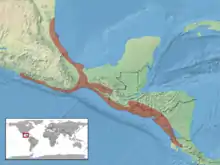| Coniophanes piceivittis | |
|---|---|
| Scientific classification | |
| Domain: | Eukaryota |
| Kingdom: | Animalia |
| Phylum: | Chordata |
| Class: | Reptilia |
| Order: | Squamata |
| Suborder: | Serpentes |
| Family: | Colubridae |
| Genus: | Coniophanes |
| Species: | C. piceivittis |
| Binomial name | |
| Coniophanes piceivittis Cope, 1869 | |
 | |
| Synonyms | |
Coniophanes piceivittis, known commonly as Cope's black-striped snake, is a species of small snake in the subfamily Dipsadinae of the family Colubridae. The species is endemic to Central America and Mexico, and is found in a wide range of habitats.[1][2]
Geographic range
C. piceivittis is found in Costa Rica, El Salvador, Guatemala, Honduras, southern Mexico, and Nicaragua.[2]
Reproduction
Subspecies
Two subspecies are recognized as being valid, including the nominotypical subspecies.[2]
References
- 1 2 Lopez-Luna, M.A.; Canseco-Márquez, L. (2007). "Coniophanes piceivittis". IUCN Red List of Threatened Species. 2007: e.T63754A12713541. doi:10.2305/IUCN.UK.2007.RLTS.T63754A12713541.en. Retrieved 20 November 2021.
- 1 2 3 4 Coniophanes piceivittis at the Reptarium.cz Reptile Database. Accessed 15 August 2016.
Further reading
- Cope ED (1869). "Seventh Contribution to the Herpetology of Tropical America". Proceedings of the American Philosophical Society, Philadelphia 11: 147–169. (Coniophanes piceiviitis, new species, pp. 149–150).
- Heimes, Peter (2016). Snakes of Mexico: Herpetofauna Mexicana Vol. I. Frankfurt, Germany: Chimaira. 572 pp. ISBN 978-3899731002.
- Peters JA (1950). "A New Snake of the Genus Coniophanes from Veracruz, Mexico". Copeia 1950 (4): 279–280. (Coniophanes frangivirgatus, new species).
This article is issued from Wikipedia. The text is licensed under Creative Commons - Attribution - Sharealike. Additional terms may apply for the media files.
